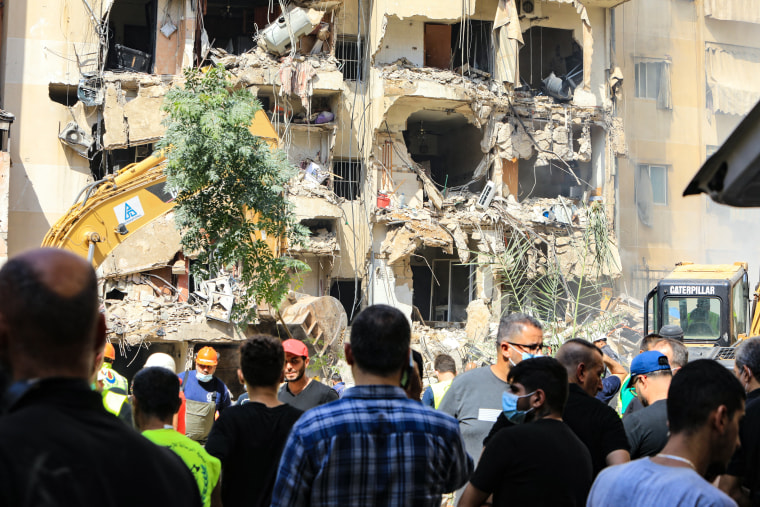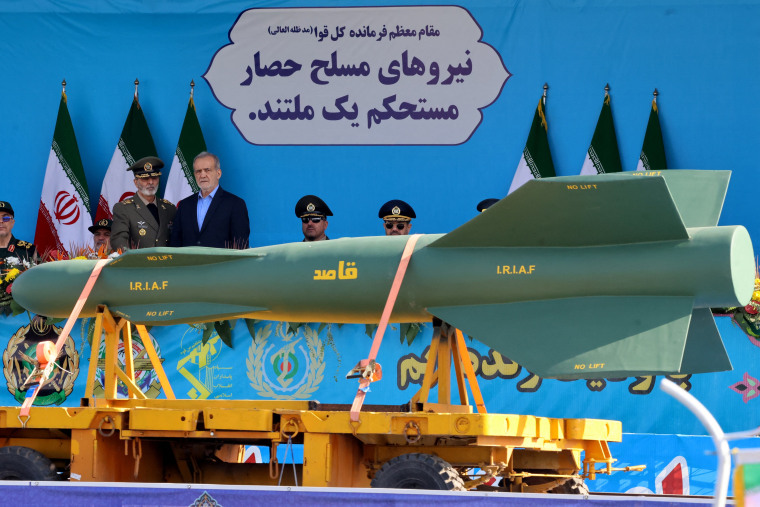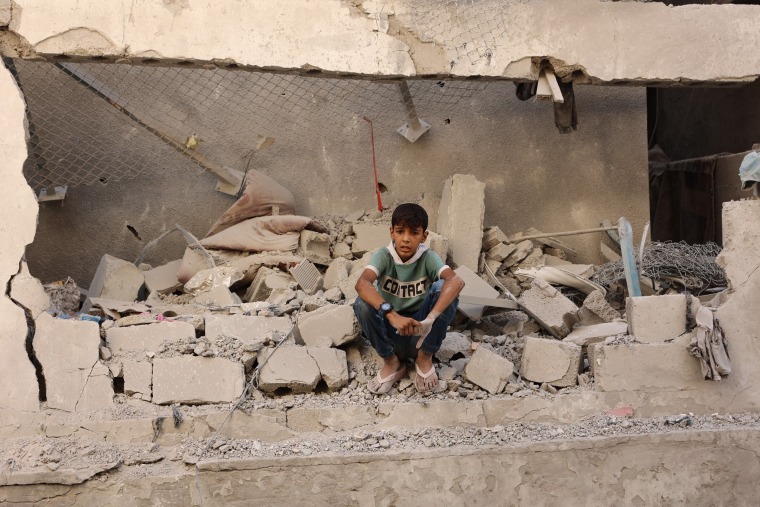Hezbollah was reeling Saturday from an Israeli airstrike that killed two of its senior figures and dozens of other people, intensifying fears of all-out conflict in the Middle East.
While the United Nations led calls for diplomacy, the two sides traded a new barrage of fire Saturday and Iran, which backs the militant and political group, said the region was “on the brink of war.”
The strike followed the coordinated detonation of pagers and walkie-talkies belonging to Hezbollah members across Lebanon, a significant escalation after months of deadly cross-border exchanges in parallel with Israel's assault on the Gaza Strip. The Israeli military carried out a strike on a school in the Palestinian enclave Saturday that it said targeted Hamas militants, but local officials said sheltering children were among 22 people killed.
And as authorities around the world probed the origins of the exploding devices, Hungary's intelligence services interviewed the CEO of a firm linked to the pagers while a walkie-talkie maker in Japan distanced itself from the blasts.

Tensions rise after Beirut blast kills 38
Hezbollah said Ibrahim Akil, who helped establish the militant and political group's elite Radwan Force, and Ahmed Wahbi, who was in charge of Hezbollah's central training unit, were killed in the strike Friday on a densely populated suburb of the Lebanese capital Beirut.
At least 38 people were killed in total, including three children, and more than 60 injured, Lebanon's health minister, Firass Abiad, told Al-Jazeera.
Hezbollah, which Washington has designated a terrorist organization, announced the deaths of 19 of its fighters, including Akil and Wahbi. Though it didn’t say whether all of them were killed in the strike, it raises to 499 the number of Hezbollah fighters killed since the Hamas-led Oct. 7 terror attacks. Israel said it confirmed it had killed at least 16 Hezbollah fighters in the strike.
The United States had been offering a reward of up to $7 million for information on Akil, who it said was “a principal member” of the group that claimed responsibility for the 1983 bombing of the U.S. embassy in Beirut.
Sirens sounded in northern Israel early Saturday as Hezbollah said it had fired artillery shells and rockets across the border, while the Israeli army said it was targeting sites used by Hezbollah in southern Lebanon.
Overnight, an estimated 10 rockets were launched from Lebanon into Israel, the Israel Defense Forces said in on X. Most were intercepted, the IDF said, but at least one landed in the Jezreel Valley area.
In a statement early Sunday local time, Hezbollah said it launched missiles into Israel's Ramat David Airbase outside Haifa "in response to the repeated Israeli attacks that targeted various Lebanese regions and led to the fall of many civilian martyrs."
Possible casualties were unavailable, but Israel has a record of repelling such attacks with few injuries.
In a separate response, U.S. Central Command said in a statement Saturday that it destroyed a drone fired from Yemen over the Red Sea. Central Command said it was launched from territory controlled by Iran-backed Houthis, who have been attacking Red Sea shipping lanes used for global trade as part of their pro-Palestinian response to the Israel-Hamas war.
"We know that Iran and many of its proxy networks, including those who are in Iraq, had designs early in this crisis to significantly broaden the conflict into a regional conflict," a senior official in the administration of President Joe Biden said in a military background briefing Friday. "They have not succeeded in doing that and we intend very much to continue."
The IDF on Saturday said it destroyed thousands of Hezbollah rocket launcher barrels that were poised for immediate use against Israeli territory.
Army spokesman Daniel Hagari on Saturday announced new restrictions on gatherings in northern Israel amid the escalation.
And at a military parade in Tehran, the Islamic Republic showed off its growing arsenal, including what it said was a new self-detonating drone.
Speaking to a gathering of officials and ambassadors, Supreme Leader Ayatollah Ali Khamenei denounced Israel for what he said were "the crimes they commit without shame" against children.

And a senior officer in Iran's Islamic Revolutionary Guard Corps (IRGC), said the region was on the brink of war.
Calling Israel's airstrike "another major crime," Mohsen Rezaee raised the prospect of widening conflict, saying "it is possible that after Lebanon, they may extend their crimes toward Iraq, Syria, or, with an even bigger mistake, toward Iran," according to a report in Tasnim, a semi-official news agency believed to be close to the IRGC.
The United Nations warned Friday that the situation in the Middle East could be about to get worse.
“If things continue as they are, we risk seeing a conflagration that could dwarf even the devastation and suffering witnessed so far,” the U.N.'s political affairs chief, Rosemary DiCarlo, told an emergency security council meeting, adding “It’s not too late to avoid such folly. There is still room for diplomacy, which must be used without delay.”
While Israel signaled its focus had shifted north, its assault on Gaza continued.
Israel said its air force had “conducted a precise strike on terrorists who were operating inside a Hamas command and control center” at a former school in Gaza City.
In addition to the 22 people killed, Gaza’s health ministry said 30 were wounded, largely women and children, in the strike on a site local officials said was used as a shelter by thousands of displaced people.
An NBC News crew on the ground in Gaza witnessed the immediate aftermath of the attack, which included scenes of dismembered bodies, blood, obliterated structures and the sounds of screaming and crying.
Survivor Haniya Qasa said such attacks in Gaza must end to stop civilian bloodshed. "This genocide against us must stop. Entire families have been wiped off the Palestinian civil registry. Why are they doing this to us?” she said.
Israel's ambassador to the United Nations, Danny Danon, spoke to the news media on Saturday and answered a question about the acceptability of civilians as collateral damage in its warfare.
"Well, when you look at the intention of whom we target, you realize that we target terrorists, period," he said. "And when you target terrorists, according to international law, you can target terrorists even if they are hiding behind civilians. We do whatever we can to minimize the casualties."

Device blasts leave a global trail
While Lebanon was left to confront the aftermath of the device attacks, officials from Asia to Europe probed how they made their way into the hands of Hezbollah.
The Hungarian government said Saturday that the country's intelligence services had conducted several interviews with the CEO of BAC Consulting, a Budapest-based company linked to the pagers.
Taiwan-based Gold Apollo, whose logo was on the pagers, said earlier this week that the devices were made by the Hungarian firm. The company’s chief executive, Cristiana Bársony-Arcidiacono, confirmed to NBC News earlier this week that her company worked with Gold Apollo, but said "I am just the intermediate.”
Hungarian intelligence agencies have interviewed Barsony-Arcidiacono several times, the government’s international press office said in a statement, according to Reuters.
And in Japan, Icom, the brand whose label was on the walkie-talkies that exploded, said it did not believe they were genuine products, pointing to the lack of holographic stickers on the devices.
In a statement Friday, the company said it believed “that it is extremely unlikely that the radio that exploded was manufactured by our company.”
The company added “we are saddened that radios/communication devices, which should be a tool for ensuring safety and peace of mind, have been used in this way, regardless of whether they are manufactured by our company or not.”
